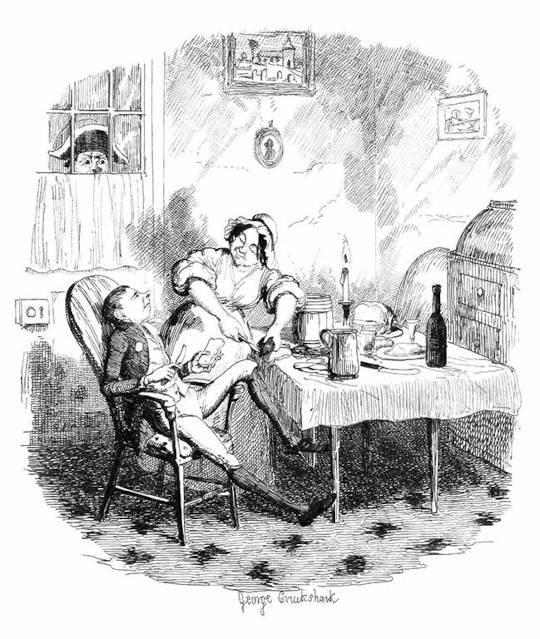June 29, 2025
Writers who spend a good deal of their time reading – as they should, since reading aids the writer in the construction and development of character and story – may at times find themselves imagining a different world for a specific character they identify with. The character in question may encourage the writer to create a new story, putting the character in an exciting new role which most people would not be able to imagine. More importantly, can the story be genuinely authentic for the character? This is something only the writer can answer.
Consider the genre of the story being written for the classical literature character. Perhaps the novel the character came from is a romance, or drama, but the writer easily finds the character thriving in a humorous short story intended to make the reader laugh. Perhaps the character exists in a science fiction world, traveling in a spaceship to the moon or even another planet.

Mr. Claypole as he appeared when his master was out.
From Oliver Twist by Charles Dickens. London: Richard Bentley, 1839. Sketch by George Cruikshank
One great example of classic literature characters being rewritten is the book "Death by Dickens", edited by Anne Perry and containing eleven gripping mystery stories written by as many authors revolving around the various fictional characters which Charles Dickens wrote about. These stories hold interest for fans of Dickens’ work and intrigue fans of mystery novels.
The characters need not be from famous English writers nor even from classic literature, strictly speaking. The characters can be from plays composed by playwrights such as George Bernard Shaw and Shakespeare. For writers who have a favorite classic writer in another language, such as the French novels by George Sand or Russian novels by Fyodor Dostoyevsky or Leo Tolstoy, creating a brand-new story from a familiar protagonist is a great way to renew interest in a classical writer. Do not overlook lesser-known classical authors such as Denis Diderot or Mary Elizabeth Braddon.
Finally, do not feel confined to eighteenth or nineteenth century writers. Some writers will feel perfectly comfortable with reading the works of Homer, Virgil, and Euripides and creating a story just for the characters. There is an endless amount of creativity which can bring classical literature characters to life that will encourage readers to seek out the original works they were first published in.
Copyright 2014-2026 Monographs of Reality. No part of this website or its articles may be reproduced in any format.
